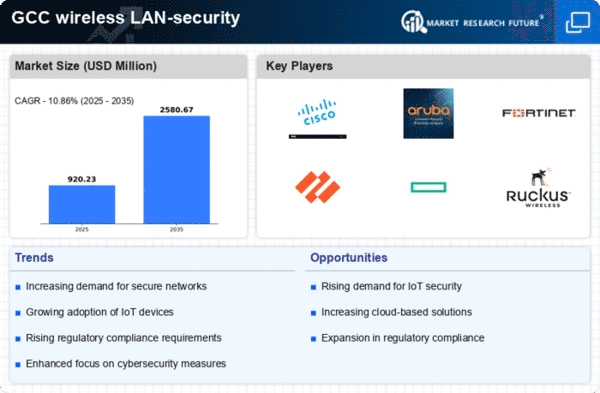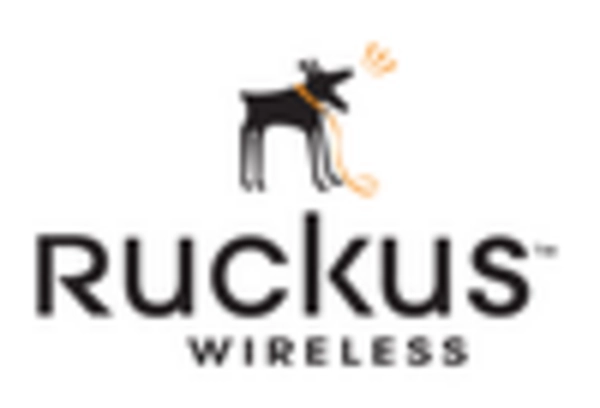The wireless lan-security market is currently characterized by a dynamic competitive landscape, driven by increasing demand for secure connectivity solutions across various sectors. Key players such as Cisco Systems (US), Aruba Networks (US), and Fortinet (US) are actively shaping the market through strategic initiatives focused on innovation and regional expansion. Cisco Systems (US) emphasizes its commitment to enhancing security protocols, while Aruba Networks (US) leverages its expertise in AI-driven security solutions to differentiate itself. Fortinet (US) is also notable for its integrated security architecture, which positions it favorably in a market that increasingly prioritizes comprehensive security measures. Collectively, these strategies contribute to a competitive environment that is both robust and evolving, as companies seek to address the growing complexities of wireless security threats.
In terms of business tactics, companies are increasingly localizing manufacturing and optimizing supply chains to enhance operational efficiency. The market structure appears moderately fragmented, with several key players exerting influence over their respective segments. This fragmentation allows for a diverse range of offerings, catering to various customer needs while fostering competition among established and emerging players.
In October 2025, Cisco Systems (US) announced a strategic partnership with a leading cloud service provider to enhance its wireless security offerings. This collaboration aims to integrate advanced threat intelligence capabilities into Cisco's existing security framework, thereby providing customers with a more robust defense against evolving cyber threats. The strategic importance of this partnership lies in its potential to expand Cisco's market reach and reinforce its position as a leader in the wireless security domain.
In September 2025, Aruba Networks (US) launched a new AI-driven security platform designed to automate threat detection and response. This innovative solution is expected to significantly reduce response times to security incidents, thereby enhancing overall network resilience. The introduction of this platform underscores Aruba's commitment to leveraging cutting-edge technology to meet the demands of a rapidly changing security landscape.
In August 2025, Fortinet (US) expanded its global footprint by acquiring a regional cybersecurity firm specializing in wireless security solutions. This acquisition not only strengthens Fortinet's product portfolio but also enhances its ability to deliver localized security solutions tailored to specific market needs. The strategic move reflects Fortinet's focus on growth through targeted acquisitions, positioning the company to better compete in an increasingly crowded marketplace.
As of November 2025, current trends in the wireless lan-security market are heavily influenced by digitalization, sustainability, and the integration of AI technologies. Strategic alliances are becoming increasingly vital, as companies recognize the need to collaborate in order to innovate and enhance their offerings. Looking ahead, competitive differentiation is likely to evolve, shifting from traditional price-based competition to a focus on innovation, technological advancement, and supply chain reliability. This transition suggests that companies that prioritize these aspects will be better positioned to thrive in the future.

















